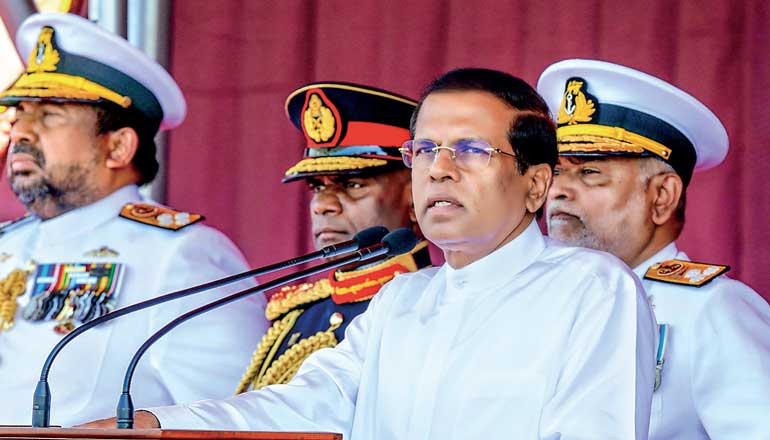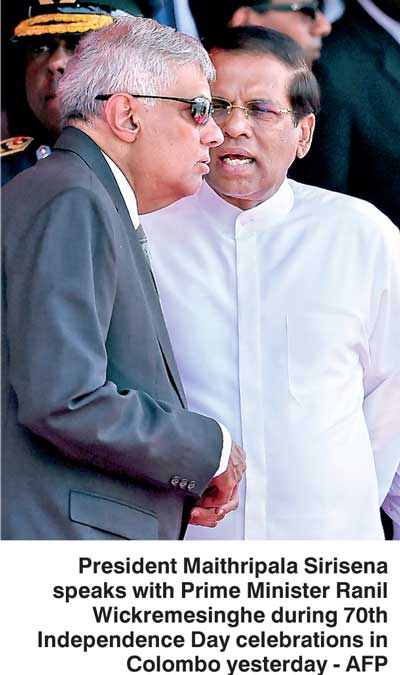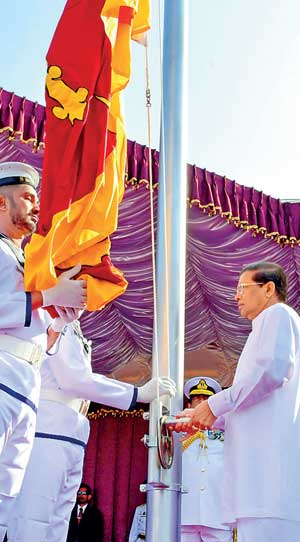Wednesday Feb 18, 2026
Wednesday Feb 18, 2026
Monday, 5 February 2018 00:00 - - {{hitsCtrl.values.hits}}
Outlining Sri Lanka’s road ahead at the 70th Independence Day celebrations, President Maithripala Sirisena yesterday put the fight against corruption at the centre of the nation’s goals, going so far as to describe it as the new form of patriotism and the greatest challenge to development.

Delivering his customary address at Galle Face, Sirisena stuck to his key political message but drew new connotations and goals for the nation in what it should aspire to achieve in the future.
“While facing development and other challenges before the nation, the honesty of the politician is very important. It is honesty that helped win the confidence of the people and help mobilise them to develop the country. Hence, on this occasion of the 70th anniversary of independence, I see the commitment, honesty and purity of the politician as an imperative need of the era for our mother Sri Lanka,” he said.
“We must commit to that with determination. Freedom is a broad and complex idea that transcends mere human freedom. I see the necessity of learning and committing ourselves to this extended meaning of freedom as schoolchildren and beyond.”

Giving new impetus to the fight against corruption, Sirisena went onto describe it as a new battle that should have the focus of every member of the citizenry and should encompass key institutions, both within and outside the public sector. He also insisted that it was the greatest challenge Sri Lanka would face in attempting to realise its economic potential.
“The fight against corruption is the self-defence of a nation. Strengthening the attitude for anti-corruption and implementing it is the self-defence of the nation to ensure its progress. When economic freedom is emerging on the soils of our motherland, we must stand against corruption, bribery and waste. Corruption has become one of the main impediments to the progress towards prosperity, which is the aspiration of all citizens. In this endeavour, it is the need of the hour that all politicians fulfil their duties in an exemplary manner.
“We must rid ourselves of laziness, lethargy or sluggishness and work towards the progress of the economy and enlightened governance with efficiency, courage, fearlessness and a fighting spirit.”
He also sought to reset the discourse on development and what is commonly defined by it and questioned whether the projects of the past decade had necessarily delivered on what was most needed by the people.
“We have to identify the national priorities for national development. I regret to state here, however, that development work that was carried out in the past few decades, ignoring such national development priorities merely to suit political or personal agendas, has brought about adverse outcomes for the national economy. Hence, undoubtedly it is necessary to identify economic proprieties in the development process and to take actions according to those priorities by the political leadership, public servant, public administration and management and the financial management.”
He also reiterated larger reform goals that have been outlined in Government plans, including the Budget 2018 and V2025 policy statements and recommitted to the target of legislative and institutional change.
“To increase efficiency in the public service of our country it’s essential to reform the archaic monetary and administration regulations. Even though certain changes have been made in past decades, you are aware that there are still some regulations, ordinances and provisions that are centuries old. They are a barrier to our future development plans. We must reform them soon to achieve efficiency in development and create a disciplined government service.”

“Similarly, we have to pay attention to some important constitutional institutions. There is a need to establish a decent political culture by democratically reforming political institutions such as the provincial councils, local government institutions, parliament, legislature and presidency. As corruption in politics has become a major threat, barrier and challenge to the progress of the nation, there is an imperative need to ensure political reforms from top to bottom and bottom to top, from local governments to the presidency and from the presidency to local governments. I underline the need to implement systematic development policies that reflect national priorities and foster a generation of disciplined politicians in the country’s march towards the future.”
Sirisena also struck a traditional note at the Independence Day celebrations, emphasising Sri Lanka’s long history and pledging to uphold cultural norms and historical practices despite the country focusing on achieving economic and technological developments.
“Our nation needs to incorporate the knowledge and advanced technology of more developed countries; but while we will do so, we will not let go of our indigenous heritage, local thinking or national aspirations. As our nation celebrates a history that spans over two millennia, the story of our development shall be written while protecting our culture, identity and our priceless heritage. This is an endeavour that requires the constant attention of the leadership of the state as well as private sectors, while always keeping the nation’s challenges in mind.”